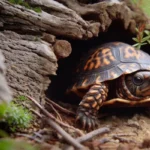Hello everyone! When it comes to the perfect pet, there’s no denying that turtles are top of the list.
Not only do they make great companions, but pet turtle lifespans can vary greatly among different species – making them a long-term commitment if you choose one as your pet.
But with such a huge lifetime responsibility ahead of you, how exactly should you care for these unique and fun animals?
In today’s post, we’ll explore 21 popular pet turtle species and their lifespans, debunk common misconceptions, and share essential care tips to help you understand what’s expected in terms of their wellbeing throughout their lives.
So let’s dive right into learning all about pet turtles: lifespans and care tips!
21 Popular Pet Turtle Species and Their Lifespans

Each turtle species has its unique characteristics, from their origin and appearance to their temperament and lifespan.
To help you make an informed decision about which turtle is right for you, we’ve compiled a list of 21 popular pet turtle species and their average lifespans.
Pet Turtle Species, Lifespans, and Sizes:
| Turtle Species | Average Lifespan | Size |
|---|---|---|
| Red-Eared Slider | 20-30 years | 10-12 inches |
| Painted Turtle | 25-30 years | 5-10 inches |
| Box Turtle | 30-40 years | 4-8 inches |
| Russian Tortoise | 40-50 years | 8-10 inches |
| Spotted Turtle | 25-50 years | 3-5 inches |
| Map Turtle | 15-25 years | 3-10 inches |
| Softshell Turtle | 20-30 years | 6-24 inches |
| Wood Turtle | 30-60 years | 5-8 inches |
| Diamondback Terrapin | 25-40 years | 5-9 inches |
| Reeve’s Turtle | 10-20 years | 5-9 inches |
| African Sideneck Turtle | 25-50 years | 7-12 inches |
| Yellow-Bellied Slider | 30-40 years | 8-13 inches |
| Greek Tortoise | 50-100 years | 5-8 inches |
| Hermann’s Tortoise | 30-60 years | 5-10 inches |
| Leopard Tortoise | 50-100 years | 10-18 inches |
| Sulcata Tortoise | 70-100 years | 24-30 inches |
| Indian Star Tortoise | 30-80 years | 6-12 inches |
| Eastern Mud Turtle | 30-50 years | 3-4 inches |
| Mississippi Map Turtle | 15-20 years | 3-10 inches |
| Cooter Turtle | 20-40 years | 9-16 inches |
| Razorback Musk Turtle | 20-30 years | 4-6 inches |
Addressing Common Misconceptions About Pet Turtle Lifespans
Let’s address and debunk some common misconceptions about the lifespans of pet turtles.

A. Debunking Myths
One common myth is that turtles can live for hundreds of years.
While some tortoises, like the Galapagos tortoise, can live over 100 years, most pet turtle species have lifespans ranging from 10 to 100 years.
Research the specific species you’re interested in to obtain accurate information on their expected lifespan.
B. Can Turtles Live Up to 500 Years?
This widespread misconception likely stems from stories about ancient, long-lived tortoises.
However, there is no scientific evidence to support the idea that any turtle species can live for 500 years.
The oldest recorded turtle, a Seychelles giant tortoise named Jonathan, is estimated to be around 190-191 years old, far from the 500-year mark.
Ensuring a Long and Healthy Life for Your Pet Turtle
To help your pet turtle live a long and healthy life, it’s essential to provide proper care, including diet, habitat, and veterinary care.

Proper Diet and Nutriti
A properly balanced diet is essential for the well-being of your turtle.
Research the specific dietary needs of your turtle species and offer a variety of foods, such as vegetables, fruits, and protein sources.
Maintaining a Clean and Safe Habitat
Clean your turtle’s tank regularly, filter the water, and ensure hiding spots and basking areas are available.
A clean habitat helps prevent illness and stress in your turtle.
Appropriate Temperature, Lighting, and Humidity Conditions
Different turtle species have specific temperature, lighting, and humidity requirements.
Research your turtle’s specific requirements and maintain these conditions for their health and comfort.
Regular Health Check-ups and Veterinary Care
Like any pet, turtles can develop health issues. Regular check-ups with a reptile-savvy veterinarian can help detect and address problems early.
Identifying Aging and Health Issues in Pet Turtles
As your turtle ages, it may develop health issues, some of which can be age-related.
Common Age-related Health Issues
Age-related health issues in turtles may include arthritis, shell problems, and organ dysfunction.
Recognizing Symptoms and When to Consult a Veterinarian
Monitor your turtle’s behavior, appetite, or appearance for changes and consult a veterinarian if you observe any concerning signs.
Preventative Measures and Treatments
To help prevent health issues, maintain proper care and provide a stress-free environment for your turtle. If your turtle develops a health issue, adhere to your veterinarian’s recommended treatment.
Fascinating Facts: The World’s Oldest Turtles
Some turtles have made history with their impressive lifespans. Here are a few examples of the world’s oldest turtles:
- Jonathan, a Seychelles giant tortoise, is believed to be the oldest living terrestrial animal, born around 1832 and still alive today. He resides on the island of Saint Helena and serves as a symbol of longevity.
- Harriet, a Galapagos tortoise, lived to be 175 years old. She was collected by Charles Darwin during his voyage on the HMS Beagle and spent her life in Australia’s Australia Zoo.
- Adwaita, an Aldabra giant tortoise, was estimated to be around 255 years old when he passed away in 2006. He lived in the Alipore Zoological Gardens in Kolkata, India.
Conclusion
Turtles as pets are intriguing beings that can deliver delight and entertainment to their owners for an extended period.
While most species have a lifespan of 10-50+ years when provided with proper care, it is important to understand the specific needs of each individual breed before committing to being a responsible turtle parent.
With some research beforehand and dedicated attention once you bring your new friend home, you’ll be sure they experience the best life possible!










